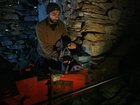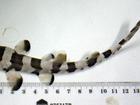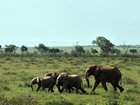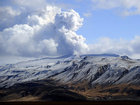A hundred and fifty years ago, in "Journey to the Center of the Earth", French science-fiction forerunner Jules Verne pictured a vast sea that lay deep under our planet's surface.
Today, that strange and haunting image has found an unexpected echo in a scientific paper.
 Full Story
Full Story
A pint-sized tyrannosaur braved the frigid Arctic and feasted on fellow dinosaurs 70 million years ago, according to a report Wednesday on a new species identified from fossilized skull bones in Alaska.
Scientists have crowned the fierce creature the "polar bear lizard," or Nanuqsaurus hoglundi, and they say it stood as tall as a modern man but was half the size of its very close cousin, T. rex, the "lizard king."
 Full Story
Full Story
Astronomers have spotted the largest yellow star ever observed in our galaxy and 1,300 times larger than the sun.
The yellow hypergiant star HR 5171 A is also in the top-10 of the largest stars known and about one million times brighter than the sun, Olivier Chesneau, whose team made the discovery, said Wednesday.
 Full Story
Full Story
Japanese electronics giant Panasonic said Thursday it would give employees sent to China a wage premium to compensate for the country's hazardous air pollution, in a possible first for an international company.
The move was part of a wider deal reached in Japan's annual labor talks which saw major firms, including Panasonic and Toyota, agree to boost workers' salaries for the first time in years, amid concerns about an economic slowdown after a sales tax rise next month.
 Full Story
Full Story
Music surfaces frequently in the great Nature vs. Nurture debate: Why can someone be a virtuoso pianist yet their neighbor be a musical duffer? Does the answer lie in genes or upbringing?
In a study published on Tuesday that compared hundreds of individuals, scientists said the first step towards answering the question may lie in DNA -- in several genes that detect and interpret sounds.
 Full Story
Full Story
As Pakistan grapples with a crippling energy crisis, people in one corner of Kashmir have taken matters into their own hands, using small-scale turbines to generate electricity from streams and rivers.
Pakistan is plagued by power cuts, lasting up to 22 hours a day in the blistering summer in parts of the country, blighting ordinary people's lives and hampering the economy.
 Full Story
Full Story
Australia has successfully hatched its first shark born via artificial insemination with hopes that the development can ultimately be used to help breed threatened species, an aquarium said Wednesday.
Sea Life Melbourne Aquarium said the brown banded bamboo shark pup was born on March 3, ending a process which began in September when aquarists collected a semen sample from a shark in Mooloolaba in northeastern Australia.
 Full Story
Full Story
A pleasantly warm and wet spell in central Mongolia eight centuries ago may have propelled the rise of Genghis Khan, according to a U.S. study Monday.
The research was based on an analysis of tree rings spanning 11 centuries, showing that the conqueror seized power during dry times and was able to expand his empire across Asia during an unusual stretch of good weather.
 Full Story
Full Story
African elephants can differentiate between human languages and move away from those considered a threat, a skill they have honed to survive in the wild, researchers said.
The study suggests elephants, already known to be intelligent creatures, are even more sophisticated than previously believed when it comes to understanding human dangers.
 Full Story
Full Story
The steam and heat from volcanoes allowed species of plants and animals to survive past ice ages, a study showed Tuesday, offering help for scientists dealing with climate change.
An international team of researchers said their analysis helped explain a long-running mystery about how some species thrived in areas covered by glaciers, with volcanoes acting as an oasis of life during long cold periods.
 Full Story
Full Story



